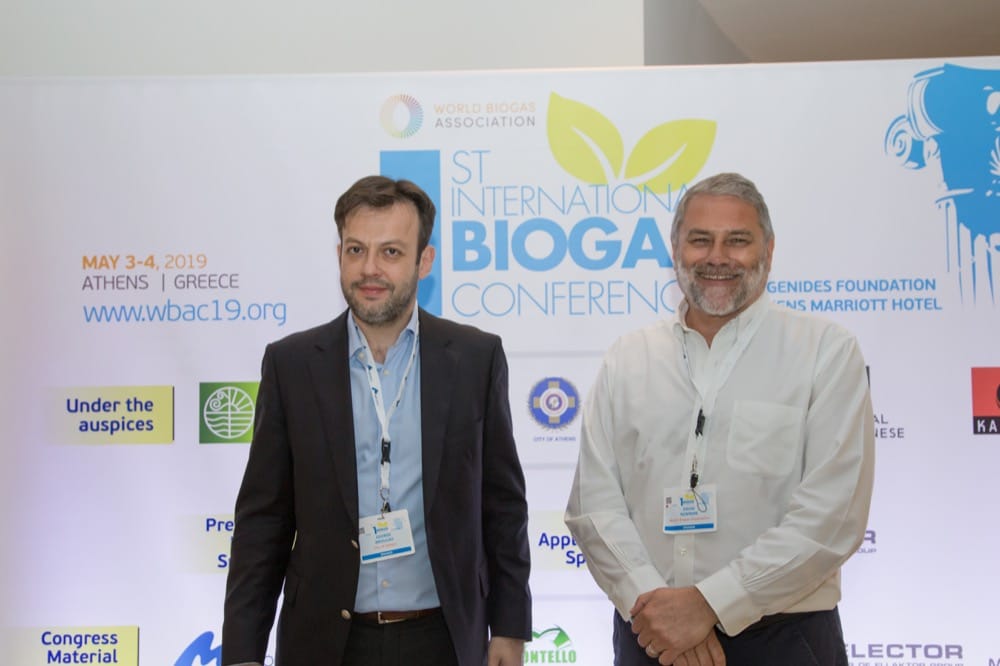
20 countries attend 1st International Biogas Conference
Sector focus delivers ‘innovative strategies on how to extract value, create jobs and protect the environment’
Joined-up thinking focused on the need to integrate energy and waste streams to mitigate against climate change while allowing sustainable growth drew delegates from over 20 countries to the first international biogas conference, held in Athens recently.
Organised by the World Biogas Association the event featured keynote speakers such as Dr Janez Potocnik, Co-Chair of the International Resource Panel of the United Nations Environment Programme, emphasizing how biogas would be a win-win for all countries seeking to meet their carbon reduction commitments under the Paris Agreement.
WBA President David Newman said, “The aim of the Congress was to discuss – and demonstrate – the role of anaerobic digestion and biogas in solving sustainability challenges for Greece and for cities, regions and nations around the world. The conference succeeded in getting key messages out to decision-makers about finance, feedstocks, solid waste, wastewater, emerging markets, academic research, and technical insight. Ultimately it is by sharing experiences at events like this that we can provide a blueprint so the biogas sector can achieve its full potential.”
Many of the most urgent problems facing urban centres worldwide require the integration of energy into wider systems such as waste or transport, which must necessarily happen locally but be encouraged and enabled globally to combat climate change and associated issues such as air pollution.
Athens is a case in point. Air quality is compromised by the practice of sending organic waste to landfill, and Greece is under an infraction from the EU for operating landfills non-compliant with EU laws. It is a situation repeated across mainland Greece and its islands. Producing biogas from organic wastes would address the issue.
Over the two days of the conference case studies from around the world showed how anaerobic digestion is a cost-competitive way of treating organic wastes while simultaneously helping towards decarbonising the planet. Adoption of the technology has the potential to reduce carbon emissions by 10% globally.
It was this kind of knowledge exchange that proved so instructive and inspiring to the 150 delegates present, with representatives attending from cities and regions across Greece and 20 countries, including America, Tunisia, Morocco, Kenya and Uganda alongside a host of European countries, the Netherlands, UK, Germany, Norway, Italy, Cyprus, Switzerland, Belgium, Czech Republic, Denmark, Gibraltar, Spain and Slovenia. Many departed the conference saying they felt they had gained great insight into how to develop an enabling environment for biogas to develop and grow.
Ahead of the Conference, the host, outgoing Mayor Georgios Kaminis said, “The greatest challenge that Athens faces is that waste management currently mainly relies on landfill disposal. In order to tackle the situation, the Municipal Authority has made it an absolute priority to lobby for the closure of illegal landfills, the treatment of hazardous waste, and the obligation to increase recycling rates.”
In Greece currently, biogas derives mainly from landfills, wastewater treatment plants and a couple of industrial applications. Although Greece has a promising potential of organic waste and especially animal manure, currently there is no farm scale biogas plant.
Mayor Kaminis said, “There is sufficient background on utilizing biogas as a potential driver for the transition to circularity. Especially, we feel that if we focus on this sector, we can further develop innovative strategies on how to extract value, create jobs and protect the environment.”
The new interim Mayor of Athens George Broulias, formerly the Vice Mayor responsible for Waste Management, has committed to pursue his predecessor’s legacy.
In the aftermath of the event he said, “The 1st International Conference in Athens was an excellent opportunity for private and public stakeholders to exchange best practices in the fields of Anaerobic Digestion and Waste management and to discuss innovative projects towards sustainable consumption and production.
“The feedback from the local industry was very positive and on behalf of the city of Athens we are very excited to have contributed to the works of the conference. We look forward to hosting the 2nd International Biogas Conference in Athens in 2020 and we pledge our full support for its success.”
The Mayor said it was apparent from discussions held during and after the event “that the Greek market is ready to start investing in AD” and they are eager to participate and support in any future event organised in Greece. Sponsors, too, expressed a similar eagerness to support a second conference.
Public stakeholders representing cities, regions and organisations, such as the Center for Renewable Energies, highlighted the need for the implementation of strategies to create an enabling environment to produce biogas for effective waste management.
Held under the auspices of the Greek Ministry of Environment & Energy, City of Athens and Hellenic Republic Ministry of Rural Development and Food, the 1st International Biogas Conference was sponsored by Kafsis, Mythical Peloponnese, Athens Convention & Visitors Bureau, Helector – member of the Ellaktor Group, Mesogeos, SESA and Montello. An associated site visit was sponsored by Helector and Mega Biogas.
Media partners were the Biogas Channel, B2Green, Ecotec, Water&Waste and Bioenergy News.

